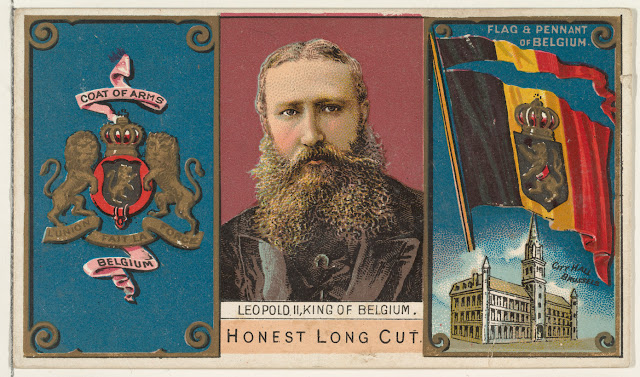 |
| Metropolitan Museum of Art |
Léopold Louis Philippe Marie Victor might seem an odd person to feature on the first day of Black History Month. He was white, spoke French and lived in Belgium. In fact, he was its ruler, King Leopold II.
And while Black History Month has always been, quite clearly, American Black History Month, history is by nature expansive. Any honest inquiry should lead you down new and unexpected pathways. History is not restrictive, though you wouldn’t know it in Florida.
I learned all about King Leopold in a shocking 1999 book called “King Leopold’s Ghost: A Story of Greed, Terror and Heroism in Colonial Africa” by Adam Hochschild.
The little Americans know about Congo 125 years ago comes from lit classes teaching Joseph Conrad’s novella “Heart of Darkness,” whose claustrophobic horrors turn out to be nearly straight reportage. During the 23 years from 1885 to 1908 that Congo was the personal fiefdom of King Leopold — it belonged to the king, not to Belgium — an estimated 10 million Africans died, worked to death harvesting rubber, or slaughtered for resisting being enslaved, or from starvation after their villages were burned.
What does any of this have to do with Chicagoans in 2023? A lot, actually. As jarring as the atrocities are — piles of amputated hands of Congolese who failed to gather their rubber quota, smoked over fires, so they can survive long journeys in the hot climate to collect a bounty — even more jarring, because it is so familiar, is the smokescreen of lies that Leopold sends billowing in all directions. At every step Africans are enslaved, their villages burned, their wives and children held hostage until they produce more rubber in order to acquaint them with Christian duty and the majesty of Western culture.
If we simply must have an American hero in Black History Month debut, there’s a good one with the marvelous name George Washington Williams, “the first great dissenter.” He served in the U.S. Colored Troops of the Union Army, fought and was wounded during the Civil War, then lived an adventurous life that saw him a soldier in Mexico, a minister in Boston, a guest of President Benjamin Harrison and finally a visitor at royal court in Belgium.
To continue reading, click here.
Sheesh...
ReplyDelete"King Leopold's Ghost" is a shocking story. One interesting aspect of this horrible saga was the actions of a man named Edmund Morel. He was the shipping agent in charge of commerce to and from the Belgian Congo. Leopold & his henchmen tried to keep the true story of what was happening a secret, but Morel, by closely examining the cargoes of inbound and outbound ships, realized that the Congo was a brutal slave state. He was one of the first to call attention to what was happening and devoted a great deal of effort to stop it. A heroic guy, IMO.
ReplyDeleteMr. S.: If you didn't write one more column for the rest of the year, this would have earned your salary, in my opinion.
ReplyDeleteI meant to reply a few days ago when I saw this. "King Leopold's Ghost" was one of the books I read last year that made me angry. Great column Neil. Hope it encourages others to read this book.
ReplyDelete